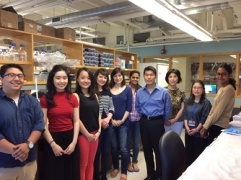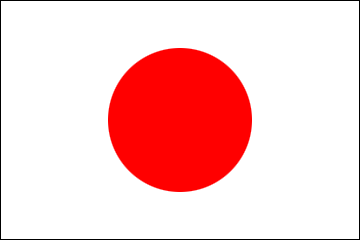Japanese Researchers in New England: Professor Tsuneya Ikezu - Boston University School of Medicine
1. What is your research area?
My research area is Alzheimer’s disease, which currently suffers 5,300,000 people in the U.S., and is known as the most common form of senile dementia. Obama recognized the significance of the disease and created the National Alzheimer’s Project Act (NAPA) in 2011 with the goal of curing Alzheimer’s by 2025, based on which it is expected that lots of progress will be made.
My lab studies one of the neuronal proteins that is believed to cause Alzheimer’s, Tau protein, and focuses on its pathological alteration and accumulation in the brain. In particular, we research the mechanism of exosomes, cell-derived small vesicles, which Tau are embedded and are extracellularly released. We have published evidence of how it affects Alzheimer’s disease in animal models. Now, we continue to examine if the results can be reproduced in isolated human patients’ exosomes. In addition, we also focus on microglia, recently spotlighted immune cells, and examine how they are involved in pathological accumulation of Tau in the brain. Genome-wide association studies revealed that many immune-related genes, especially for phagocytes including microglia, have some role in Alzheimer’s disease. Thus, we are interested in how mutations of these genes can affect the function of microglia and if they can be targeted for drug development.
2. What made you want to do research in the U.S.?
The first time I came to the U.S., it was 24 years ago when I went to UCSF for immunology research. That was right after my residency at Tokyo University Hospital. That experience led me to experience the cutting-edge research environment, which I thought was very exciting. After 2 years, I returned to the U.S. for completing my biomedical research. I spent 3 years working hard at Massachusetts General Hospital. Afterwards, I went to Cleveland Clinic to do a post-doc and then moved to University of Nebraska as Assistant Professor and held my tenure up to Professor. After the ten years tenure there, I came to Boston University 6 years ago as Professor of Pharmacology and Neurology.
This is my personal view but in many aspects, especially the population of researchers and students, the number of pharmaceutical companies and bio ventures, the number of universities and their prestige, and the diversity of the population, Boston is the greatest place for foreign researchers to do research in the U.S.
3. What do you think about research life in the U.S.?
The good part of research life in the U.S. is that you can access the latest knowledge and cutting-edge technology immediately, especially in Boston since there are world-class researchers. It is advantageous if you want to do collaborative research or use consultants, both of which are essential to make timely progress in innovative research.
As for the bad part, it is a very competitive place to do research since the best and the brightest will come from all over the world. I have to attend conferences and keep up with the latest articles, and always have to be careful of not having my research scooped by others. It is mentally and physically tough, so I have to maintain my health and energy.
4. Can you compare the research environment in the U.S. to Japan’s?
I have mostly experienced research in the U.S, so I am probably not the best person to compare them. However, according to what I’ve heard from people who have researched in Japan, The U.S. used to be much more advanced in terms of budget, institutions, protocol committees for animal experiments and safety, and good post-doc system when I came here 24 years ago.
Nowadays in Japan they can get a top-notch research environment in big universities or institutes, but not in local or small ones. Japan has to invest more financially in research and provide infrastructure and human resources to make these universities more productive. Another strength of the U.S.’s is its long-sustaining charity culture, which can support research funding and infrastructure at local universities. Advocacy groups collect funds or lobby congress on their agenda, but Japan doesn’t have a culture of doing this.
However, as a good part in Japan, once you have a permanent post in Japan, you are awarded with a more stable working environment. Researchers in Japan don’t have to continuously earn their salaries from competitive research funding, unlike here in the U. S., where this is a cause of enormous competition and stress among researchers.
5. What’s your opinion on further progress in Japanese science?
I would say the medical residency, graduate program, and post-doc programs need to be improved. MDs in Japan usually want to be practicing doctors rather than researchers and care about the salary. That tendency creates a lot of practicing doctors who do not value research and who cannot understand the joy received from research accomplishments. As a consequence, there are much less MDs from Japan come to the U.S. to do research than before.
There is a MD-PhD program in the U.S., which can promote the career track of physician scientists. In Japan, not many PhD researchers do medical research and one of the reasons is that MD-PhD program is not common, which depletes physician scientists. I strongly concern that this situation will deplete future leaders who can educate true translational medicine from basic to clinic in Japan. Also, in order to balance the progress of basic and practical research, Japan has to increase research funding based on researcher’s needs and with more diversified funding policies. To do that, Japan needs to create specialized policy development professionals in the same way that the U.S. does, as it is a good career for people who have PhDs and seek an alternative to a research career.
6. Do you have any advice for Japanese researchers who want to do research in the U.S.?
In my case, I came here in the middle of graduate program because my supervisor moved to Harvard. This caused a lack of hosting laboratory in Japan and I naturally continued research in the U.S. I worked very hard because I really liked my research, although surviving in this competitive environment is not an easy task. I don’t recommend doing research just to survive in the U.S., unless you truly enjoy it. I believe the best time to come here is after getting your PhD and securing connections in Japan so that you have some place to go back if necessary.
7. What are your research goals or dreams?
I hope our on-going research will lead to the development of preventive or curable drugs for Alzheimer’s disease. More precisely, we would like to identify the Tau accumulation mechanism, which will allow us to make an inhibitor screening system and examine the selected drugs through clinical trials. To materialize this goal, more joint efforts between the industry and academia is necessary to accelerate the progress. Beyond the boundaries between the U. S. and Japan, my laboratory will maximize our given environment to achieve our goals.


| 1991 | M.D., University of Tokyo Faculty of Medicine |
| 1997 | Ph.D., University of Tokyo Graduate School of Medicine Research fellow at MGH and Cleveland Clinic |
| 1999 | Assistant to Full Professor at University of Nebraska |
| 2010 | Professor of Pharmacology & Experimental Therapeutics and Neurology, Boston University School of Medicine |
